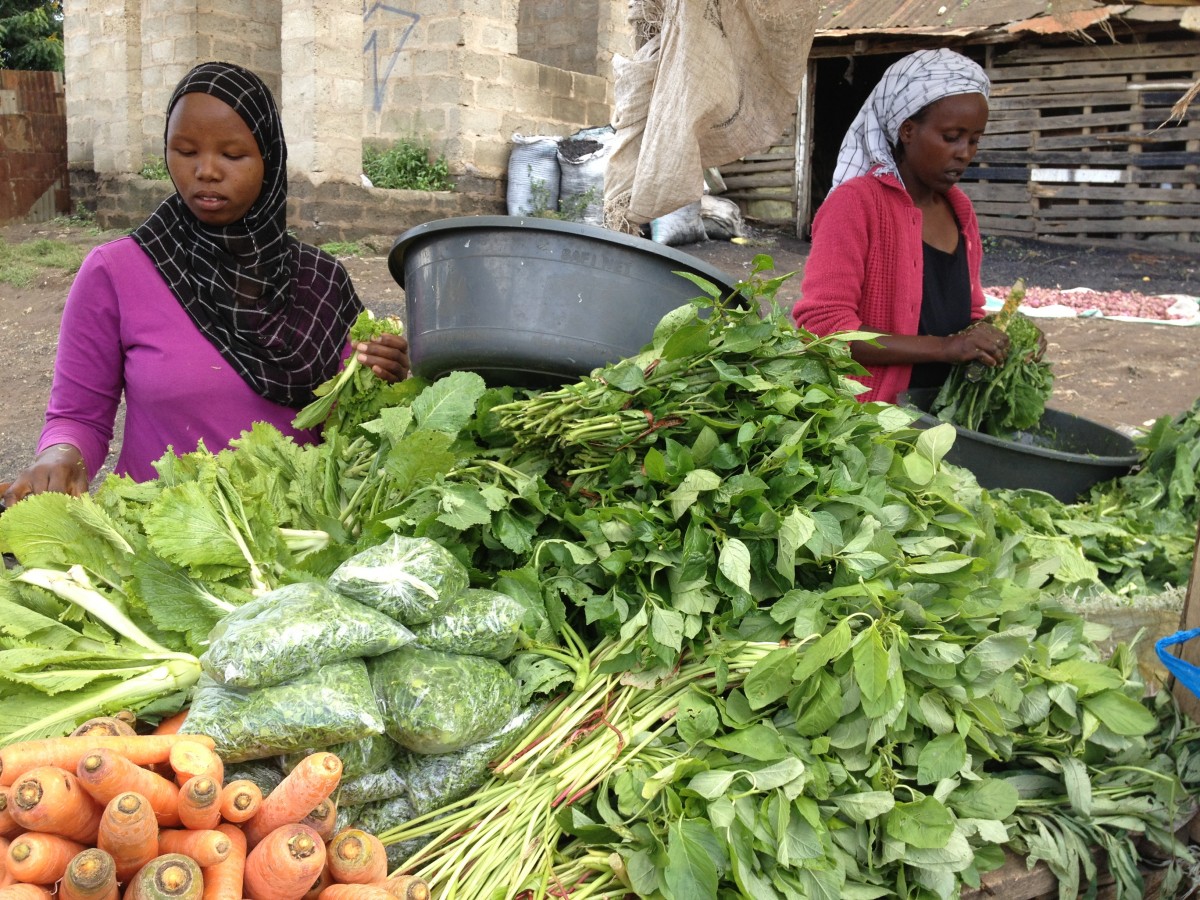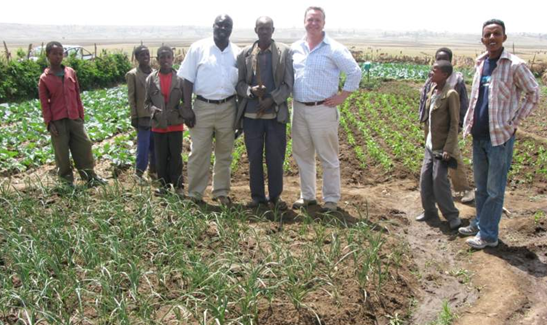More than half of the world’s population now lives in urban areas. As cities increasingly absorb population growth while at the same time drawing in people from rural areas, the question arises: who will produce food to sustain those city dwellers?
The answer is the urban dwellers themselves and farmers close to major population centres.
‘Improving Income and Nutrition in Eastern and Southern Africa by Enhancing Vegetable-based Farming and Food Systems in Peri-urban Corridors,’ a new project being led by AVRDC – The World Vegetable Center and partners funded by Australian International Food Security Research Centre (AIFSRC) within the Australian Centre for International Agricultural Research (ACIAR), aims to develop peri-urban vegetable production in Ethiopia, Malawi, Mozambique and Tanzania. The project seeks to address societal shifts due to rapidly changing demographics, increasing demand from urban consumer markets, and an urgent need for a more nutritious food supply, while at the same time increasing income opportunities.

Populations in the four target countries are young, and expanding. Young people in search of stable employment migrate to Dar es Salaam, Addis Ababa, Lilongwe, Maputo and smaller cities throughout the region, but often are disappointed by the lack of job opportunities. These youth constitute labor that can be mobilized for agricultural production in and around the cities where they now live, particularly since the smaller and aging proportion of the population remaining in rural areas cannot feed fast growing urban populations. To reduce youth migration and increase opportunities for gainful self-employment, governments in the target countries are interested in developing nearby production basins or corridors to supply their cities with food
“Peri-urban” refers to a transition zone around cities where urban and rural activities occur together in a landscape that’s often subject to rapid human modification. Land in peri-urban corridors with an adequate supply of water as well as good transport connections that allow produce to reach cities within 2-3 hours has potential for the production of fresh vegetables.
“Producing vegetables for cities is often a lucrative endeavor for farmers because of the quick return on investment and the high prices fresh produce can fetch,” said Victor Afari-Sefa, project leader.
In addition to providing employment for youth and improving incomes, labor-intensive peri-urban vegetable production can lead to greater diversity in diets—an urgent and vital need in the target countries, where micronutrient malnutrition is widespread. Local diets based on cassava, maize and other cereals are high in carbohydrates, but low in micronutrients and vitamins. Increasing the amount and variety of nutrient-dense vegetables in diets can sustainably alleviate micronutrient deficiencies. Currently people in the target countries consume only about 200 grams of fruit and vegetables per person per day—about half the amount recommended for good health—and many consumers remain unaware of the health benefits of vegetable consumption.
Knowledge is the key input for successful vegetable production, and the lack of it is felt in a myriad of ways across the region. Outdated production methods and marketing systems curtail supply; weak channels for dissemination and adoption of agricultural research and improved technologies further hinder progress. The vegetable value chain stagnates when research cannot inform practice.
The project’s Best Practice Hubs are designed to fill these knowledge gaps. The hubs—centres for crop trials and experimentation that also serve as educational interventions—will draw young producers into communities of practice, where they can learn, evaluate, and adapt vegetable production and postharvest technologies to support income-generating activities, attract the attention and custom of traders, and begin to build strong market demand among consumers for fresh produce and processed vegetable products. The hubs will serve as best practice demonstration sites for the farming communities surrounding them.
National partners selected the vegetable production corridors for their hubs, keeping in mind local land tenure systems (to ensure that trained youth have access to land), gender relationships (to ensure equity and maximum returns to households) and community engagement (to ensure scalability).
Hub participants will identify and grow the most productive and nutritious cultivars of traditional African vegetables such as Ethiopian kale and amaranth, and introduced vegetable crops like tomato and peppers. With improved production skills, it’s expected the peri-urban farmers will be able to boost their profitability while providing more healthy and safe choices at the market for consumers.

The project seeks to train 480 vegetable business professionals in 120 communities. About 6000 vegetable farming families are expected to benefit from the extension of successful technologies and management models developed in the hubs.
“We also intend to closely examine the integration of research into the vegetable value chain,” said Afari-Sefa. “For instance, we want to know if the hubs will strengthen the capacity of national research partners in delivering improved technologies and practices, and if the research interventions can promote collaborative relationships for postharvest storage, value addition and processing.”
Project partners were chosen from their proven track records in agricultural development. In Ethiopia, partners are the Ethiopian Institute of Agricultural Research (EIAR) and International Development Enterprise (iDE); for Malawi, Africare Malawi and the Department of Agricultural Research Services (DARS)/Bvumbwe Agricultural Research Station; for Mozambique, Instituto de Investigação Agrária de Moçambique (IIAM) and the International Potato Center (CIP); and for Tanzania, the Horticultural Research and Training Institute, Tengeru (HORTI-Tengeru) and AVRDC. The project will also draw on the experience of the Australian Applied Horticultural Research (AHR) in integrated crop management.
In early October the project inception workshop was held in Arusha, Tanzania. The project director Dr Abdou Tenkouana opened the workshop and inspired the participants by outlining how this project will contribute to lifting people out of poverty by improving nutrition and increasing incomes. By bringing the project partners together the inception workshop enabled participants to set up project operational structures and committees, develop work plans and milestones, and set up task forces to address cross country themes including production, post harvest and nutrition, and policy and capacity building. Most importantly the workshop enabled project partners to get to know each other, develop strong relationships and build communication networks that will set the project off to an excellent start. Read more about this inception workshop.
Read an article about the project in the AVRDC newsletter
Article by Project Leader Dr Victor Afari-Sefa, AVRDC
